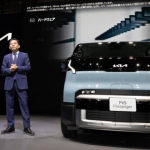In a bold move to stay ahead in the global automotive race, Volkswagen Group has committed to investing up to €1 billion (roughly US$1.2 billion) in artificial intelligence by 2030, deploying it across its vehicle development, manufacturing, and IT operations. The announcement, made at the IAA car show in Munich, marks a major pivot in VW’s strategy—placing AI at the heart of its transformation toward more agile, efficient, and competitive autos.

What Volkswagen’s Plan Entails
- AI Everywhere in the Value Chain
Volkswagen isn’t treating AI as a side project. The goal is “no process without AI”—from initial design and engineering to production lines and post‑sale services. AI-supported vehicle development, industrial applications, manufacturing optimization, and upgraded IT infrastructure are all on the menu. - Speeding Up Innovation Cycles
One concrete target: reduce the vehicle development timeline by about 25%, approximately 12 months, aiming for full cycle times of 36 months or less. That means models can go from concept to launch faster, giving VW an agility boost in an industry where delays can be costly. - Savings and Efficiency Gains
VW estimates that by 2035, its AI initiative could produce up to €4 billion in savings through efficiency gains, process optimization, and cost avoidance. That’s a hefty payoff for an upfront investment in technology. - Infrastructure, Partnerships, and Resilience
- Expanding high‑performance IT infrastructure, including VW’s “factory cloud” and Digital Production Platform (DPP), to connect production sites globally.
- Building an AI‑powered engineering environment in partnership with entities like Dassault Systèmes, enabling virtual testing, component simulations, etc.
- Exploring large industry‑scale models (for example via Catena‑X), to share data securely across suppliers and manufacturers.
- People, Ethics, and Regulation
It’s not just tech and machines. Volkswagen has begun training its workforce (hundreds of thousands of employees) to adapt to AI‑driven workflows. The company is also emphasising responsible deployment, digital sovereignty (especially within Europe), and the need for supportive regulatory frameworks.
Why This Matters—For VW and the Industry
- Staying Competitive: As EV makers, especially in China, push out tech‑loaded vehicles, traditional automakers must adapt or risk falling behind. Lowering development time gives VW more agility to respond to trends and competitor moves.
- Cost Pressures and Efficiency Demands: Supply chain inflation, energy costs, and materials shortages are squeezing margins. AI offers tools to optimize resource use, predict maintenance issues, and streamline production. The promise of €4 billion in savings speaks directly to that pressure.
- Technological Shift in Automotive: The future is software‑defined vehicles. AI will not only help in designing better hardware but also in developing digital features, connected systems, and perhaps more autonomy and safety functionality. VW is laying groundwork for that shift.
- Regulation, Sovereignty, Ethics: Europe has been vocal about data protection, regulation, and maintaining control over its tech destiny. VW’s plan includes respecting those concerns, which could help avoid friction and regulatory setbacks.

Potential Challenges & What to Watch
- Implementation Hurdles: Scaling AI across hundreds of processes isn’t trivial. Data quality, integration of legacy systems, ensuring security, and managing change among staff are all major tasks.
- Regulatory Uncertainty: While VW is calling for regulation that supports AI, the rules around AI (especially industrial, safety, and privacy domains) are still evolving in Europe. Missteps can lead to delays or compliance costs.
- Cost vs. Benefit Realization: The savings estimates are significant, but they depend on successful implementation and realizing efficiencies. It might take longer than expected, or unforeseen tech or supply issues could complicate the picture.
- Competition: Others in the automotive space are also investing heavily—Tesla, BYD, Chinese OEMs, and even newcomers. Being first isn’t enough; being effective is what counts.
Looking Ahead
Volkswagen’s €1 billion AI investment by 2030 isn’t just about sleeker cars or fancy tech. It’s about transforming how vehicles are designed, built, and maintained. It’s a bet that AI will shrink timelines, boost quality, cut waste, and help VW retain leadership in a fast‑evolving industry.
For consumers, this could mean better‑performing electric vehicles, quicker roll‑outs of new models, more reliable features, and possibly lower costs. For the industry, it underscores that AI is no longer experimental—it’s fundamental.

Hello, my name is Muskan Kumari and I am an experienced Digital Marketer. I have been blogging for the last 3 years and I have special interest in SEO. Here I give you easy bikes and writes easy-to-understand reviews and news about the latest bikes, helping readers choose the best options.. My aim is to always provide you with accurate, new and useful information.










